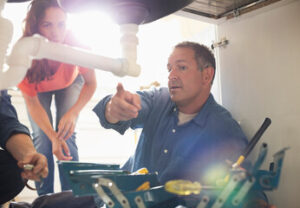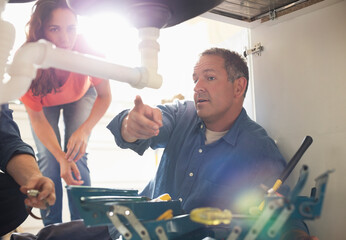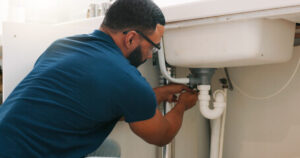Shreveport Plumber covers everything in your home, from the sinks and toilets to the water service lines that connect to them. Knowing the various plumbing systems and their components can help homeowners make informed decisions that improve their home’s comfort, safety, and value.
Mastering residential plumbing installation also enables homeowners to handle small maintenance tasks, saving them money on professional services. This article will explore traditional and innovative residential plumbing techniques
 Residential plumbing is a system of pipes that transports water to and from various appliances and fixtures inside your house. It is important to have a well-functioning plumbing system as it contributes to the health and cleanliness of your home. Residential plumbing also involves the drainage system, which removes wastewater and other waste materials from your home. In most cases, this is done through a sewage system connected to the municipal sewer line or a septic tank in rural areas.
Residential plumbing is a system of pipes that transports water to and from various appliances and fixtures inside your house. It is important to have a well-functioning plumbing system as it contributes to the health and cleanliness of your home. Residential plumbing also involves the drainage system, which removes wastewater and other waste materials from your home. In most cases, this is done through a sewage system connected to the municipal sewer line or a septic tank in rural areas.
The drainage system in your home works on gravity, meaning it does not require pressure to push wastewater through the pipes. All the sinks, toilets, and other appliances in your house are connected with drains which are linked to a main pipe. This drain pipe runs horizontally, but with a slight downward slope, through your lowest floor and out to the municipal sewer or septic system.
If your home has a septic tank instead of the municipal sewer line, the house drainage pipe is connected to this through a special trap. This prevents sewage from the public sewer line from entering the household drains and causing health and sanitation problems.
It is common to have issues with your drainage system. The most common is a blocked drain, which usually occurs when soap scum, food particles, and other debris build up in the pipes. To prevent this, you should regularly clean your drains with commercially available products.
Another common problem is low water pressure, which can be caused by a number of factors. One cause is mineral deposits in the water supply lines, which can be removed by using a water softener. Another reason is a leak in the water distribution pipe, which can be repaired by replacing the damaged part.
Aside from the drains and water supply lines, residential plumbing also includes a hot water system. An offshoot of the main water pipe carries hot water to the kitchen, bathrooms, and other parts of the house. This water is used for washing clothes, dishes, and other daily chores. To ensure that you have enough hot water for your needs, it is recommended to install a water heater in your house.
The water supply lines are the pipes that deliver fresh, potable drinking water to every fixture in your home. They start at the public water distribution line buried under the street (also called the water service line) and lead to your home, where they connect to your hot and cold water taps and appliances like toilets, washing machines, and dishwashers. They also supply the outdoor faucet (tap) you use to water your lawn and garden.
The water lines are typically made of copper, brass, plastics such as PEX or polyethylene, or galvanized steel. The type of material you choose depends on your budget, installation process, and other factors. In general, though, copper and PEX are the most popular options for residential plumbing.
A quality water supply line is resilient and can withstand high water pressure. It also reduces the risk of leaks and other problems that could disrupt your daily routines. In addition, the best water supply lines are compatible with modern appliances that require a stable, consistent water flow.
When a water line becomes damaged, it may cause your plumbing fixtures to stop working. This can be a major inconvenience, and it can also result in water damage and costly repairs. That’s why it’s important to keep up with regular maintenance, including checking for leaks and repairing any damage promptly.
Leaks are the most common problem with water supply lines. They can occur for many reasons, from wear and tear to corrosion and age-related issues. You can also prevent water leaks by regularly flushing your home’s plumbing system and ensuring all valves are in good condition.
The best way to avoid leaks and other plumbing problems is to hire a professional plumber for routine maintenance, inspections, and repairs. The professional can also install pressure absorbing devices to eliminate water hammer, a common problem caused by high water pressure or long runs of pipe. In addition, the professional can ensure your water lines are correctly sized to accommodate your home’s fixtures and appliances. This will help you save money on utility bills and avoid costly water damage.
If you’re building a new home or renovating an existing one, it’s essential to consider the plumbing setup. Not only will this ensure that your pipes are safe and secure, but it will also help you save money on water bills. In addition to installing the plumbing system, you’ll need to make sure that your water pressure is high enough to prevent flooding and backflow. A professional plumber can help you decide what size and type of pipes to install.
A residential plumbing system consists of a network of piping that brings freshwater in and drains waste water out. It also includes appliances like toilets, sinks, and showers. Residential plumbing is relatively simple to install, but it’s important to have a professional plumber inspect it regularly for leaks and other problems. This can save you a lot of money in the long run.
Residential plumbing systems are generally made of PVC or copper. These are cheaper materials than stainless steel and can withstand the strain of daily usage. Commercial plumbing, on the other hand, is more complex and requires a higher-grade material to withstand heavy usage.
Before you start laying the plumbing lines, it’s important to get the necessary permits. This can take some time, but it’s worth the effort to ensure your house meets building codes and safety requirements. In addition, securing a permit will help you avoid future pipe malfunctions.
During the installation process, it’s important to have shut-off valves installed in key areas to protect your home from water damage. Also, it’s a good idea to have a water pressure regulator to ensure your home has adequate water pressure. Once the plumbing is in place, it’s easier to finish the rest of the construction.
When building a new home, you should choose a plumbing contractor who is experienced and licensed in your area. A professional plumber can help you design a plumbing system that will meet your needs and budget. They can also help you find the right fixtures and materials for your home. Choosing the right fixtures will ensure that your plumbing system works properly for years to come.
The plumbing system is an intricate network that brings in fresh water, heats it for washing, and distributes it throughout the home. It’s easy to take it for granted until something goes wrong. Then we realize that without a functioning plumbing system, life can be quite difficult. Fortunately, most plumbing problems can be avoided with regular maintenance and simple precautions.
Plumbing maintenance involves checking for leaks, clogs, and other issues that can be easily prevented or resolved. For example, a leaky faucet that goes unnoticed can cause water to seep under the sink and damage the floors or walls. A clogged drain can be costly to clean and shortens the lifespan of your waste pipes. It’s also important to ensure that your water shut-off valves are working properly. Most homes have individual shut-off valves for each fixture, which allow you to cut the water supply to a particular area in case of an emergency or to perform repairs.
Leaky toilets, broken or rusted pipes and clogged drains can cost you thousands of dollars in repairs and higher water bills. By performing some simple maintenance tasks, you can reduce the risk of these problems occurring and save money in the long run.
While many people call plumbers when they have an emergency, it’s far better to prevent plumbing problems with regular maintenance and inspections. This includes regularly checking for leaks, preventing clogs, and ensuring that your water heater and septic tank are in good working order.
In addition to avoiding costly repairs, regular maintenance and inspections can help you extend the lifespan of your plumbing systems and fixtures. By identifying and addressing small issues before they become bigger problems, you can avoid expensive repairs and keep your water bill low.
Some simple maintenance tasks you can do include regularly cleaning your lint traps in your washing machines and removing any hair from shower drains. You should also ensure that you don’t put grease, oils and food scraps down the drain, as these can clog your pipes and lead to blockages. In addition, a yearly sewer line maintenance check is essential to prevent clogs and other problems.



